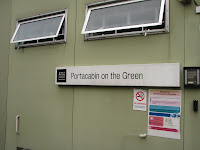I was very much at peace and feeling calm throughout the first day of my journey as an Associate Family Therapist - contributing to this would be the friendliness of staff and course mates, as well as my prior experiences of group supervision and participation in reflecting team. An observation I shared with the team is that most coursemates are still rather reserved, probably keeping the energy to keep up the stamina for future; also the more risk I take to share and experience, the more I would learn and take responsibility for my learning; the more colleagues who do the same, the more the group growth too!
I like the way our programme leader addresses my course mates and I as 'colleagues', which is a constant reminder that these two years will be a bridge leading to our future careers as family therapists or psychotherapists.
I enjoyed the experiential learning portions like the "speed dating", reflecting team and dyad discussions. I also liked our first class Personal Professional Development (PPD) class answering the century-old Marcel Proust questionnaire on "What do I like doing most". All in all, lots of experiential learning!
I'm also mindful of my tendency to doze off when it comes to lecture-style learning situations. I'm glad that I did not feel so for the entire day. Also found it amazing that a century-old questionnaire could still be so intriguing and useful right now, helping me to get to know myself a little more though asking myself questions I have never thought of asking - the question of how I would want to die (in my sleep with my closed ones at my side). I will keep my answers and compare them with my answers one year from now as an MSc student!
What struck me most in the Placement Introduction class was that we are not just acquiring clinical skills to work with families, but also creating a platform for ourselves to understand the role of a Family Therapist and to re-position ourselves as a family therapist, over and above our current profession, in my case, a social worker. A word used which I like is "de-skilled", just like we need to take off our clothes, feel naked first before we could don on fresh ones!
From the questions posted and sharing by the MSc students, as well as my own thoughts, I gather that we are all concern about the challenges that we would face in clocking the 60 (Certificate) or 240 hours (MSc) of supervised clinical hours. IOP is stricter - the only hours we could clock are 1.5 hours for conducting therapy (or co-therapy) and 20 minutes as a reflecting therapist. Important thing I learnt though is to have a balanced sentiment over this - on one hand to be proactive to raise red alert as soon as I notice I'm really lagging behind, yet on the other, to also stay mindful of the experiential learning I would gain even from the hours that I were to be unable to clock such as case conferences, discussions, etc.
Two key pointers for myself to stay mindful which I hope to record it here so that I could revisit and remind myself regularly:
1. A colleague reflected something important that never occurred to me, that my tendency to be overly focused in organising things to the extent that I could get overwhelmed and lose the sense of priority; this could have been my way to overcompensate my lack of self-confidence, especially in the past. I now believe these two have strong co-relation to each other in me, as through my years of working, my self-confidence have been built up and the times when I get overwhelmed with overly organising things have lessened.
2. The importance of being consistent in writing and not to accumulate back log, something which I was mindful when I started working as an aftercare officer but lapsed over the months. This will be a huge goal I am committed to achieve and to gather mutual support from my colleagues!




No comments:
Post a Comment